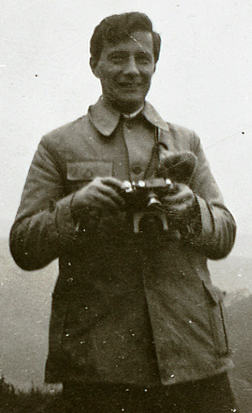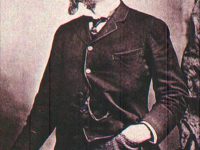
Michael Polanyi (1891-1976)
On March 11, 1891, Hungarian-British polymath Michael Polanyi was born. Polanyi made important theoretical contributions to physical chemistry, economics, and philosophy. He argued that positivism supplies a false account of knowing, which if taken seriously undermines humanity’s highest achievements.
“When order is achieved among human beings by allowing them to interact with each other on their own initiative — subject only to the laws which uniformly apply to all of them — we have a system of spontaneous order in society.”
– Michael Polanyi, The Logic of Liberty (1951)
Michael Polanyi – Early Years
Michael Polanyi was born the fifth child in a liberal Jewish family. His father, Mihaly Polascek, was a successful railway engineer and railway owner, his mother was born in Vilnius as Cecile Wohl. In 1890 Polascek hungarized his name to Polányi. In 1900 his father had to stop the operation of his railway line after a storm and went bankrupt. After completing his medical studies in Budapest in 1913, Polanyi began studying chemistry at the TH Karlsruhe. The conscription as a medical officer of Austria-Hungary in World War I interrupted his studies, Polanyi was not very busy due to illness. After his doctorate in physical chemistry in Budapest (under Gustav Buchböck) in 1919, he returned to Karlsruhe, where he met his wife Magda Elizabeth Kemény, also a chemist. The marriage, which was concluded in 1921, produced two sons, George (1922-1975, economist) and John (born 1929, chemist in Toronto, Nobel Prize for Chemistry in 1986).
Physical Chemistry
Polanyi moved to Berlin in 1920, where he finally became head of a department at the Kaiser Wilhelm Institute for Fibre Chemistry. With the mathematical foundations he laid for the analysis of fiber scattering patterns, he founded the field of fiber diffraction. In 1923, he moved to the Kaiser Wilhelm Institute for Physical Chemistry and Electrochemistry (now the Fritz Haber Institute of the Max Planck Society). His experience of runaway inflation and high unemployment in Weimar Germany led Polanyi to become interested in economics. Because of the increasing persecution of Jews in Nazi Germany, and especially under the impression of the Reichstag fire, Polanyi accepted a call to the chair of physical chemistry in Manchester in 1933, which he held until 1948. In 1962 he was elected to the American Academy of Arts and Sciences. One of his outstanding achievements is the interpretation of the plastic deformability of crystals by the mechanism of dislocation, which he published in 1934 at the same time as two other independent discoverers. Polanyi is also regarded, together with Henry Eyring, as the founder of the newer chemical reaction kinetics.
Philosophy – The Search for Truth
“The recognition of certain basic impossibilities has laid the foundations of some major principles of physics and chemistry; similarly, recognition of the impossibility of understanding living things in terms of physics and chemistry, far from setting limits to our understanding of life, will guide it in the right direction. And even if the demonstration of this impossibility should prove of no great advantage in the pursuit of discovery, such a demonstration would help to draw a truer image of life and man than that given us by the present basic concepts of biology.”
– Michael Polanyi, Life’s irreducible structure (1968)
In his first philosophical publications, Polanyi was convinced that the foundation of all research was the power of independent thought and the motive of the search for truth; he first set out his position in the philosophy of science in 1946 in Science, Faith and Society. The establishment of a Chair of Social Sciences in Manchester in 1948, created especially for him, freed Polanyi from all teaching obligations and allowed him to prepare for the Gifford Lectures at the University of Aberdeen (1951/52), from which he developed his main philosophical work Personal Knowledge (1958) in nine years of work. After his retirement in 1959, he went to Merton College at Oxford University. Tacit knowledge, as distinct from explicit knowledge, is an influential term developed by Polanyi in The Tacit Dimension [5] to describe the idea of know how, or the ability to do something, without necessarily being able to articulate it or even be aware of all the dimensions, for example being able to ride a bicycle or play a musical instrument.
The Liberty of Science
In a series of articles, re-published in The Contempt of Freedom (1940) and The Logic of Liberty (1951), Polanyi claimed that co-operation amongst scientists is analogous to the way agents co-ordinate themselves within a free market. Just as consumers in a free market determine the value of products, science is a spontaneous order that arises as a consequence of open debate amongst specialists. Science (contrary to the claims of Bukharin) flourishes when scientists have the liberty to pursue truth as an end in itself. He derived the phrase spontaneous order from Gestalt psychology,[2] and it was adopted by the classical liberal economist Friederich Hayek, although the concept can be traced back to at least Adam Smith.[1] Polanyi (unlike Hayek) argued that there are higher and lower forms of spontaneous order, and he asserted that defending scientific inquiry on utilitarian or sceptical grounds undermined the practice of science. He extends this into a general claim about free societies.
Liberty of Economics
According to Polanyi, a free society that strives to be value-neutral undermines its own justification. But it is not enough for the members of a free society to believe that ideals such as truth, justice, and beauty, are objective, they also have to accept that they transcend our ability to wholly capture them. The objectivity of values must be combined with acceptance that all knowing is fallible. In Full Employment and Free Trade (1948) Polanyi analyses the way money circulates around an economy, and in a monetarist analysis that, according to Paul Craig Roberts, was thirty years ahead of its time, he argues that a free market economy should not be left to be wholly self-adjusting. A central bank should attempt to moderate economic booms/busts via a strict/loose monetary policy.
Later Years
Polanyi advocates emergence i.e. the claim that there are several levels of reality and of causality. He relies on the assumption that boundary conditions supply degrees of freedom that, instead of being random, are determined by higher-level realities, whose properties are dependent on but distinct from the lower level from which they emerge. An example of a higher-level reality functioning as a downward causal force is consciousness – intentionality – generating meanings – intensionality. In the USA, where he gave several lecture series, Polanyi met with a greater response. The Terry Lectures of 1962 at Yale University were published in 1966 in revised form as The Tacit Dimension. Another collection of central essays by Polanyi from 1959-1968 appeared in 1969 under the title Knowing and Being. His last monograph Meaning, published in 1975, was dedicated to the new focus of his work. It contains Polanyi’s lectures at the Universities of Texas and Chicago from 1969 to 1971. Michael Polanyis philosophy has become very important for the Anglo-Saxon dialogue between natural sciences and theology.
Michael Planyi died on 22 February 1976 in Northampton, England, at age 84.
Michael Polanyi, Lecture 1: The Destruction of Reality, [9]
References and Further Reading:
- [1] Adam Smith and the Wealth of Nations, SciHi Blog
- [2] Kurt Koffka – Perception and Gestalt Psychology, SciHi Blog
- [3] Polanyi Society home page
- [4] Stines, J. W.: “Time, Chaos Theory and the Thought of Michael Polanyi.” JASA 44 (December 1992): 220–27.
- [5] Smith, M. K., 2003, “Michael Polanyi and tacit knowledge.” The encyclopaedia of informal education
- [6] “Life’s Irreducible Structure”. Michael Polanyi. Journal of the American Scientific Affiliation. Volume 22 (December 1970): 123–31.
- [7] Works by or about Michael Polanyi at Internet Archive
- [8] Michael Polanyi at Wikidata
- [9] Michael Polanyi, Lecture 1: The Destruction of Reality, Michael Polanyi giving the McEnerney Lectures (1962)
History and Hope: An Analysis of Our Age, Tradition and Discovery @ youtube - [10] Timeline of Philosophers of Science, via Dbpedia and Wikidata





